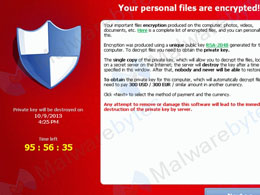
Malware Uses Victims' Machines to Mine Bitcoin Until Ransom is Paid
A new Trojan has been discovered by Emsisoft, producer of PC security software. This is no garden-variety Trojan, however, it is a curious hybrid of bitcoin-mining malware and ransomware. Whereas most ransomware directly attacks your PC or encrypts files stored on its drives, 'Trojan-Ransom.Win32. Linkup' blocks internet access by modifying your DNS and turns your computer into a bitcoin-mining bot at the same time. Luckily, it shouldn't be hard to spot when your system has been infected. 'Linkup' blocks all internet access bar a bogus Council of Europe website, which will demand personal....
Related News
TorrentLocker is one of the cyber world's most recent forms of ransomware, infecting several computer systems all over the globe and taking data hostage, refusing to release it unless a bitcoin ransom is paid. As of now, the primary victims appear to be countries in Europe. Nations such as Italy, Germany, France, Spain and the Czech Republic are on the list of prime targets, along with other nations such as the U. K., Australia and Canada. But a big shocker, however, is that out of approximately 40,000 victims only about 570 have ultimately paid the bitcoin ransom that TorrentLocker....
98.55% of victims targeted by TorrentLocker do not pay the virus' bitcoin ransom, according to a new report. TorrentLocker (aka Win32 or Filecoder. DI) is a strain of bitcoin ransomware that works by encrypting users' files. Victims are requested to pay up to 4 BTC to decrypt their documents, though this figure can vary. The report, authored by Marc-Etienne M Léveillé for security firm ESET, found that only 570 out of 39,760 infected systems were given access to decryption software upon paying the full ransom. "In other words 1.44% of all infected users we have identified have paid the....
Victims of malware, such as bitcoin ransomware Cryptolocker, should just pay off the perpetrators if they want to see their data again, an FBI agent has advised. According to Security Ledger, Acting Special Agent Joseph Bonavolonta, who oversees the bureau's Boston office, told C-level executives at Wednesday's Cyber Security Summit they'd be better off stumping up the ransom. According to an FBI report from June, this sum can be anywhere from $200 to $10,000. Bonavolonta said: "The amount of money made by these criminals is enormous and that's because the overwhelming majority of....
CryptXXX and a wide range of ransomware are making waves on the internet as they affect computers and claim bitcoin ransom from their victims. A recently released report has confirmed that hackers behind the ransomware CryptXXX had received $60,478 worth of bitcoin in ransom payments since June 4. The newer version of CryptXXX has been making rounds since late May 2016. The criminals behind the ransomware, as expected have patched various vulnerabilities that existed in the previous versions to release version 3.0 of the malware. These upgrades to the code have made CryptXXX immune to....
Palo Alto Networks has discovered a unique malware family that can mine bitcoins via the victim’s CPUs and GPUs. The malware, called PWOBot, is completely written in Python and compiled via PyInstaller, generating a Microsoft Windows executable, according to a Palo Alto Networks posting. The malware has affected European organizations, mainly in Poland. A Polish file-sharing service delivers the malware. The malware can download and execute files, log keystrokes, execute Python code and mine bitcoins via the affected computers’ GPUs and CPUs. The malware has been noticed as far back as....




